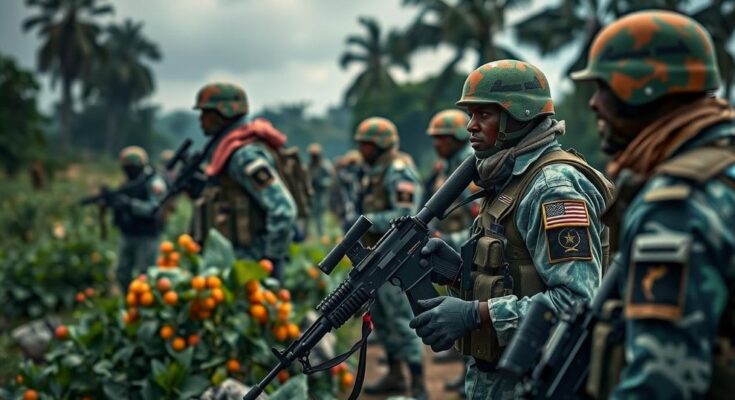The Democratic Republic of the Congo is grappling with a push to expel UN peacekeepers as violence surges, particularly from the Rwanda-backed M23 militia. Deteriorating conditions and dissatisfaction among locals regarding UN effectiveness have created a complex and dangerous environment. With rich mineral resources at stake, the outcome of both the UN’s potential departure and localized conflicts remains uncertain and poses a significant risk for the nation.
The Democratic Republic of the Congo (DRC) is in a precarious situation as it seeks the withdrawal of United Nations (UN) peacekeepers, yet ongoing violence fueled by militia groups complicates this process. The UN peacekeeping mission, known as MONUSCO, was scheduled to leave by December, but escalating conflicts, particularly in the eastern regions, have prompted a delay. This area, rich in vital minerals, has been a focal point for numerous armed factions, contributing to a humanitarian crisis affecting millions of internally displaced persons. Local sentiments have shifted against the UN presence, with many citizens expressing dissatisfaction regarding the peacekeepers’ effectiveness in curbing violence or providing security. During engagements with local militias, armed groups articulated that they view external forces as occupiers while fighting to protect their territories against insurgent groups like the M23, which allegedly receive backing from Rwanda. The situation continues to evolve as regional dynamics and international interests in the DRC’s mineral wealth create a complex landscape. With the global market relying heavily on Congolese resources such as cobalt and tantalum, the implications of both peacekeeper withdrawal and escalating violence are profound and far-reaching.
The DRC has been embroiled in conflict for decades, largely driven by the control of valuable mineral resources. The MONUSCO mission was established to stabilize the region, yet the political landscape remains fraught with tensions among domestic and foreign armed groups. As the government seeks to take over security responsibilities from the UN, the persistent threat from militias, many of which operate with impunity, presents a formidable challenge. The region’s wealth in minerals exacerbates these conflicts, as various factions seek to control these valuable resources, further complicating efforts toward lasting peace and security.
The proposition to remove UN peacekeepers from the DRC amidst ongoing violence signifies a critical juncture for stability in the region. The dissatisfaction among the populace regarding the effectiveness of MONUSCO, combined with the strategic implications of mineral control, underscores the complexity of the conflict. For the government, balancing the aspiration for sovereignty with the practical realities of entrenched violence will be vital to determining the future of peace and security in the DRC.
Original Source: apnews.com




